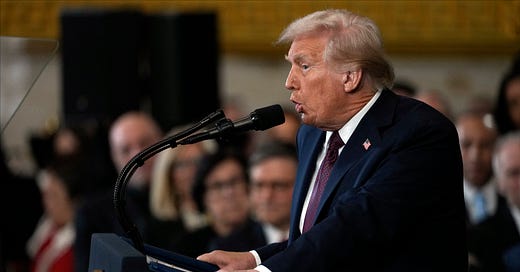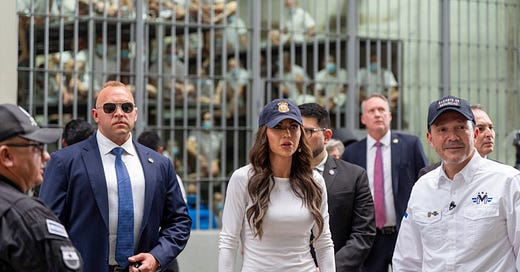
Lies and False Pieties: Don’t Buy Donald Trump’s Presidential Act
He hasn’t suddenly turned into a caring, patriotic statesman who tells the truth.
THIS MIGHT BE THE FIRST TIME a president-elect took the oath of office and most of America knew he had already violated it countless times in his decade of public life.
“What are the chances / Chief Justice Roberts will say, / ‘Please obey this oath’?” Washington Post reader Laurie B. asked in a pre-inauguration haiku. They were zero, of course, and it would have been futile in any case.
If this were an opera, it would be a farce about an absurdly villainous sleazeball. In reality, at least so far, it’s a stew of irony and tragedy: Donald Trump, with his tech courtiers looking on and his hand strangely not resting on the two Bibles his wife was holding for him, reclaiming the presidency in the same Capitol Rotunda where his supporters defecated, rampaged, and assaulted police in the deadly January 6th riot intended to keep him in power and keep Joe Biden out.
The presidential oath is pretty basic: “I do solemnly swear (or affirm) that I will faithfully execute the Office of President of the United States, and will to the best of my Ability preserve, protect and defend the Constitution of the United States.” The Constitution itself begins with a simple overview of what America expects from its leaders: “provide for the common defence, promote the general Welfare, and secure the Blessings of Liberty to ourselves and our Posterity.”
Even just in the past few weeks as a civilian, Trump was 0 for 3, with his taunts and threats to allies, immigrants, transgender people, and the Californians who have lost homes, livelihoods, and even loved ones this month in an apocalyptic and ongoing outbreak of wildfires aggravated by climate change. His bizarre cabinet nominations for health and defense, meanwhile, lack most or all of the expertise, experience, and character traits needed to do their jobs.
Is it possible to have unrealistic expectations of Trump at this point? Yes, and I’m sorry to say that did. I anticipated a conventionally pleasant inaugural address followed by a return to Trump’s norm of dark lies laced with self-absorption. Instead, he started with a variation on “I alone can fix it”—in this case, “The Golden Age of America begins right now.” With him. And, speaking of over the top, “I was saved by God to make America great again.”
Until Trump showed up this week, apparently we were not a safe, sovereign, proud, prosperous, or free nation, and the Justice Department was “vicious, violent, and unfair”—weaponized against him, he presumably means, when all he did was encourage a deadly riot, try to overturn an election, and when he was forced to leave office, hoard top-secret defense documents at his golf club.
Projection, lies, and partisanship
AS ALWAYS WITH THIS DISORIENTING FANTASIST, we are through the looking glass. We are inside the children’s book The Backward Day, and we are living every real day as if it were National Backward Day (actually coming up on January 31). We are in American carnage mode, which is the same as Trump campaign mode. Everything is terrible (it’s not), believe him (don’t).
Nearly every line in Trump’s address calls for a fact check. If there’s a crisis of trust, he fueled it with lies and misinformation. If a “radical and corrupt establishment has extracted power and wealth from our citizens,” the 2017 tax law he signed and the extension he plans are prime examples. Are “the pillars of our society” “broken” and in “complete disrepair”? If we’re talking about the current Supreme Court, why, yes. But Trump had a lot to do with that.
So much projection, so many lies, such blatant partisanship where care and compassion are in order. A government that can’t manage a crisis? That would be Trump’s handling of the pandemic. Rampant sanctuary for dangerous criminals from prisons and mental institutions all over the world? No and hell no. A country that can’t deliver emergency services to “the wonderful people of North Carolina” or Los Angeles, where fires rage “without even a token of defense”? Ridiculous on its face, but even more so from a climate-change denier who blocked $20 billion in aid to Puerto Rico after massive hurricane damage and then obstructed an investigation into why that happened.
Does Trump really think he’s going to “give the people back their faith, their wealth, their democracy, and indeed, their freedom”? Anyone who’s been paying attention knows that list is a Backward Day classic. Anyone who hasn’t been paying attention should start researching abortion bans, incursions on LGBTQ rights, the billionaires sucking up to Trump, the tax law he put on the books, and GOP plans to starve the IRS.
As for Trump declaring he’s been “tested and challenged more than any president in our 250-year history,” Abraham Lincoln, Franklin D. Roosevelt and many other presidents would like a word. Does he really believe he’s going to “reclaim our republic”? We haven’t lost it yet, but he tried his damnedest to kill it in 2021.
Trump’s performative patriotism
POSSIBLY THE MOST GALLING PART of Trump’s president act is the people who believe his performative patriotism. The competition for best patriot has haunted campaigns at least since 1988, when I started covering presidential candidates. For decades it dogged Democrats. No matter what they did, they could not capture the flag. They could not capture the country music, proud-to-be-an-American vibe that seemed so crucial to winning.
Michael Dukakis put off a Harvard Law School acceptance in 1955 and enlisted in the Army, which sent him to South Korea as a radio operator. But in his presidential campaign 33 years later, he climbed into a tank, flashing a smile and wearing a helmet that made him look like Snoopy, and quickly became the target of a lethal George H. W. Bush attack ad.
Bill Clinton survived an extramarital sex scandal in his 1992 campaign—and then, just before the New Hampshire primary, was forced to explain a 1969 letter in which he thanked a colonel for “saving me from the draft.” He spun his way to a second-place finish with lines like “The real character issue and the real patriotism issue in this election is who has a vision for the country, a plan for the future, and the ability to get it done.” Then he spun his second-place finish as a triumph and himself as the “comeback kid.” He won the White House with 43 percent of the popular vote in a three-way general election.
Al Gore, Clinton’s vice president, enlisted in the Army after college and spent six months as a journalist in Vietnam before becoming a divinity and law school dropout, a newspaper reporter, and, finally, a House member and senator. He lost the Electoral College in 2000 to the well-connected George W. Bush, who got a National Guard slot when few were available.
John Kerry, who enlisted in the Navy after college, walked onstage at his home-state 2004 convention in Boston and announced, with a smart salute, “I’m John Kerry and I’m reporting for duty.” He commanded a Swift Boat in Vietnam for four months of his four year-career, and his “numerous awards” included the Silver Star, Bronze Star, and Purple Heart. He talked about the flag belonging to everyone, he made a big play for veterans, and he, too, lost to George W. Bush.
Military service has not done much if anything for Democrats—Clinton won the nomination against two primary opponents, Bob Kerrey and Doug Wilder, with heroic war records. And then he won the presidency against George H.W. Bush, who enlisted at 18 and survived two close calls in World War II.
Republicans, meanwhile, have not been penalized for not serving—an indifference that has peaked with Trump. Patriots baffle him. People who give their lives for their country earn his scorn. This has been true ever since he said of John McCain in 2015, “He’s a war hero because he was captured. I like people that weren’t captured.”
In 2018 Trump infamously remarked to staffers that he didn’t want to visit military cemeteries because they were filled with “suckers” and “losers.” His utter disregard for the duties and values of patriotism became even more evident after his attempted coup. And by the end of his first day back in office, Trump had done what in his backward world he considers patriotic: For 1,500 people involved in the January 6th Capitol riot, he issued pardons (including for those who assaulted police), commuted sentences, and ordered that pending cases be dropped.
I’ve spent years writing about liberals and the “tough love” mindset that includes critiques along with embraces, whether it’s Kerry returning from Vietnam and testifying against the war, or reading Consumer Reports to compare cars and not buying American until the cars got better. I didn’t truly understand why my husband, a veteran, hung a flag on patriotic holidays until the 9/11 attacks awakened protective instincts in me, for my country and even for the grazing cows I saw—my cows—as I drove down I-95, home to Washington, after witnessing and reporting on the attacks.
Trump says things like “we will restore American promise and we will rebuild the nation that we love, and we love it so much.” Those words sound empty to me and, I’m betting, to millions of others. We noticed that Joe Biden reclaimed the republic, and Trump shows every sign that he’ll try to crush it. Again.
To borrow a Jesse Jackson phrase, our charge is to keep patriotism alive. Not the Donald Trump kind. The real kind.

















